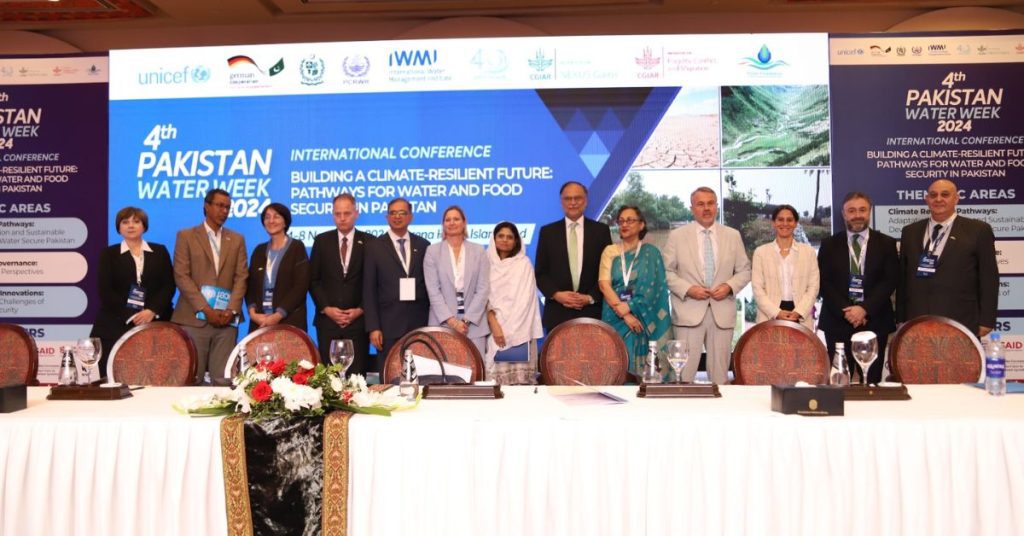
[ad_1]
ISLAMABAD: Pakistan Water Week 2024, a five-day international conference that will bring together water scientists, academics, government officials, representatives of development agencies, and policy experts from home and abroad to discuss the country’s water issues, begins on Monday.
The conference, which will run until Friday in the federal capital, focuses on “Building a Climate-Resilient Future: Pathways for Food, Water, and Food Security in Pakistan.” It was organized by the International Water Management Institute (IWMI) Pakistan to celebrate its 40th anniversary.
This event is held in collaboration with the Pakistan Council of Research in Water Resources (PCRWR) and the CGIAR Research Program on Water, Land, and Ecosystems (WLE), along with support from USAID, the FCDO, and UNICEF.
Minister for Planning, Development, and Special Initiatives Professor Ahsan Iqbal highlighted Pakistan’s vulnerability to climate change-related disasters, calling for global support to combat the challenges confronted by the country on this front.
The minister emphasised the nation’s proactive role in addressing global water and food security issues, highlighting the urgency for collaborative global action.
He spoke candidly on Pakistan’s vulnerability to climate change despite its minimal contribution to global carbon emissions. “Pakistan stands on the frontlines of a crisis caused largely by others, and the poorest among us are paying the highest price,” he remarked, recalling the devastating floods of 2022, which left millions of Pakistanis suffering.
He stressed that international cooperation was essential in supporting Pakistan’s adaptation efforts, which have already impacted millions nationwide.
Acknowledging global efforts to address water crises, Ahsan Iqbal praised international initiatives such as the Sustainable Development Goals (SDGs) and the Decade of Action for Water (2018–2028).
He commended platforms like the UN Water Conference, Stockholm World Water Week, and Africa Water Week for promoting knowledge sharing and innovation. “Pakistan is an active participant in this global movement, striving to lead in water conservation and climate adaptation despite our vulnerabilities,” he affirmed.
Highlighting Pakistan’s rich irrigation infrastructure, which spanned over approximately 17 million hectares, the minister acknowledged the system’s pressures from population growth, industrialization and environmental degradation. He revealed that while agriculture consumed over 90 percent of Pakistan’s water resources, inefficient irrigation methods led to significant water losses, even up to 40% in some areas.
He cited climate-induced impacts, including floods, droughts and glacial melt that have disrupted the lives of over 40 million people and caused an economic loss surpassing $30 billion. To address these challenges, Pakistan has outlined strategic objectives through its National Water Policy, launched in 2018, and allocated 12.2% of its Public Sector Development Program (PSDP) budget to water resource management.
With Rs 98 billion earmarked for water projects for the current fiscal year, Ahsan Iqbal underscored the government’s commitment to sustainable water management. He further elaborated on the government’s 5Es Framework, which prominently addressed environment and climate change and emphasizing water and food security.
Self-reliant adaptation, and ecosystem-based strategies like the Recharge Pakistan program, and the National Flood Protection Plan, updated in light of the 2022 floods, reflect Pakistan’s strategic response to climate-induced natural disasters.
Federal Secretary and Minister of Water Resources Syed Ali Murtaza stressed the urgent need to tackle the complex issues facing Pakistan’s water sector. During the discussion, he maintained that addressing these challenges requires comprehensive solutions beyond technical considerations.
Water governance is a critical issue that must be prioritised to manage the nation’s water resources effectively. “We are familiar with the issues, including seasonal changes, droughts, and water scarcity,” Murtaza stated.
Recognising water as a vital resource for production and a crucial component of the environmental cycle, Murtaza noted that the government of Pakistan has identified water as a key priority due to its essential role in economic development. “The life of people in Pakistan depends on water, particularly in agriculture, where our extensive irrigation system plays a significant role,” he said.
Director General IWMI Mark Smith, a keynote speaker at the event, highlighted that collaboration and innovative strategies are essential for achieving climate-resilient solutions in a world increasingly affected by climate change. Smith emphasized the urgent need for collective action among water community partners to address the growing uncertainties surrounding our water resources.
The global water cycle is dangerously out of balance, leading to heightened risks, including changing river flows, severe climatic shifts, and prolonged droughts. As these extremes become more frequent, effective management strategies are critical. “The water community plays a pivotal role in tackling the uncertainties of the future,” Smith stated.
Unpredictable weather patterns, from La Niña to El Niño, have intensified the impacts of climate change, resulting in heavy rainfall and droughts that disrupt ecosystems and production systems. As these fluctuations continue, the implications for global water security are profound.
While scientific advancements are crucial, Smith warned that they are not enough alone. “Collective actions across sectors and communities are essential to confront these challenges,” he noted.
Director, Water, Food, and Ecosystem at IWMI, Dr Mohsin Hafeez, shared Pakistan Water Week, an initiative to strengthen stakeholder relationships and foster innovative solutions to the country’s pressing water security challenges.
“Water security is vital for Pakistan’s future. Through this event, we aim to bring together experts, policymakers, and community leaders to address the critical issues surrounding our water resources collaboratively, ” Mohsin remarked.
“We look forward to engaging in discussions and collaborative efforts that will lead to sustainable solutions for water management in Pakistan,” Dr Hafeez stated. We can ensure a secure water future for our communities and the environment. Dr. Iskandar Abdullaev, the Country Representative of IWMI, and Ms. Simi Kamal, the Board Chair of IWMI, also spoke.
The first-of-its-kind conference will have 13 thematic sessions throughout the weeklong program. It will also focus on digital innovations, climate-resilient solutions, and nature-based solutions, and the role of women’s leadership and the media in the context of water will also be explored.
[ad_2]
Source link





